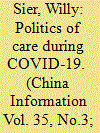| Srl | Item |
| 1 |
ID:
097840


|
|
|
|
|
| Publication |
2010.
|
| Summary/Abstract |
Why is it that some authorities, governments/administrations, and even entire regimes emerge from disasters more popular and politically stronger, while most appear to emerge less popular and politically weaker, sometimes fatally so? This paper argues that the often problematic political consequences of disasters can be understood more fully by seeing them as "Maslowian Shocks" with strong revelatory components where public estimation of government disaster response may be analyzed along six "5C+A" dimensions: capability, competence, compassion, correctness, credibility, and anticipation. The paper then illustrates the 5C+A framework with a set of cross-national examples and public opinion data from a 2001 post-earthquake survey in El Salvador.
|
|
|
|
|
|
|
|
|
|
|
|
|
|
|
|
| 2 |
ID:
182975


|
|
|
|
|
| Summary/Abstract |
This article employs the concept of care as a lens through which to examine the anti-COVID-19 measures taken in post-lockdown Wuhan. Based on photographs that depict the Chinese response to COVID-19 at the epicentre of the virus outbreak, the article analyses the visibility of anti-virus measures as a form of government communication inscribed textually and symbolically onto the urban landscape. The state demonstrates its care and capability by implementing highly visible high-tech measures to contain the virus. Bringing care into the literature on crisis management in China sheds light on the Chinese state’s reaction to COVID-19 in eliciting nationalist sentiments and positive feelings of cooperation while stigmatizing critical voices as uncooperative and unpatriotic. It shows that care is central not only to the functioning of liberal democracies: the Chinese state also relies on narratives about care to showcase the superiority of its political system and to distinguish between desirable and unwanted forms of citizens’ political engagement after the COVID-19 outbreak.
|
|
|
|
|
|
|
|
|
|
|
|
|
|
|
|